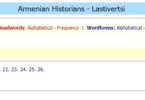| In 1962, on the occasion of the 1600th anniversary of St. Mesrop’s birth, contemplating the Armenia’s plight at the beginning of the 5th century, Paruyr Sevag wrote.
Western Armenia was finally annexed by Byzantium, making the partition of Armenia an irreversible fact and persistent condition of Armenian national life. Armenian statehood was more than bruised; it was fatally wounded, its backbone broken beyond repair. Any competent political scientist cannot but understand that Eastern Armenia was similarly facing a fate similar to Western Armenia, namely, complete colonization. As it was, Eastern Armenia had long since ceased to be an independent kingdom and had become a de facto dependency of Persia. Armenia’s physical rulers were in reality nothing more than puppets in the hands of higher powers. |
The Pen is Mightier than the Sword[1] by Paruyr Sevak
On the 1600th anniversary of Mesrop Mashtots’s birth
Mashtots’s Act of Daring
“A good beginning is half the battle.” The truth of this familiar phrase is perhaps no more apparent than when we write of Mashtots. Where shall we begin?
Perhaps the best place to start is from the beginning. It is true that the Armenians existed centuries before Mashtots. It is also true that they had statehood and an oral tradition, they knew how to build monuments and altars, they made wine and forged statues, they went to the theatre and enjoyed the artful dancing maidens who “sang” with their hands.
Imagining something and envisioning it, albeit similar, are still essentially different.
Children can imagine, but only an adult can envision.
Mashtots came to change our vision, change our vision of our existence, change our vision of who we are.
Children are born, cut teeth, walk, and start to speak and discern things, but for those first three or four years they live outside of their lives, because they lack memory of those first three or four years. Thus, the day of their birth in reality should be, not the day that their parents celebrate, but the first day they remember.
What is measured in years for an individual’s life is measured in centuries for the life of a nation. The pre-Mashtots part of our life passed before we could remember ourselves. It was Mashtots who activated our memory, our memory of our existence and of our essence.
This is not an exaggeration, but a simple conclusion from our sixteen-century-long national life, a conclusion flowing from our convoluted history, from Mashtots till today.
In truth, who was Mashtots?
The Armenian Church, which due to the loss of statehood was our sole national institution, through the ages has annually celebrated Holy Translators’ Day. So, for centuries Mashtots has been revered first and foremost as a translator of the Holy Scriptures. Armenian history emphasized a fact known by any school child: that Mashtots was the creator of the Armenian alphabet.
Before and after us, many nations have created alphabets and translated the Bible. In the life of all nations having one’s own alphabet as well as one’s own translation of the Bible are significant events.
What about for us?
Comparisons to the creators of other alphabets have been made most frequently by non- Armenians. For example, Marquardt, the world-renowned German orientalist, who know many living and dead Eastern and Western languages and alphabets, noted:
“If we consider the circumstances under which Mashtots and Sahak through their intellectual labors awakened the religious and national self-consciousness of the Armenian people, and if we were to compare it with the gift given to the German people by Pepin the Franc along with his collaborator Winfred, with every resource at their disposal, then the contributions of the latter pale by comparison to the achievement of these giants.”
This German scholar’s words did not arise from Armenian pride, let alone vanity. Rather this German scholar was recording minutes of a deliberation that had gone on for centuries, a deliberation with an agenda consisting of only one issue: our existence or disappearance as a nation.
This is why today, with the perspective of sixteen centuries, Mashtots stands out first and foremost as a political leader, the glory of whose bloodless victory surpasses even our most valiant generals’ achievements.
* * *
More than the inventor of our alphabet and founder of our literary tradition, Mashtots was first and foremost a great political leader.
Would it be an overstatement to say that we Armenians have not displayed special abilities in the field of politics? Moreover, our ancient and modern history are rife with incontrovertible examples of political debacles. After using the root աջ aj (‘right/correct’) to create so many hundreds of words, in politics, our forebears mostly used their ձախ dzakh (‘left’) hand. Thus, we have ձախորդութիւն dzakhordutyun (‘failure’), ձախաւերութիւն dzakhaverutyun (‘downfall’) and ձախողակութիւն dzakhoghakutyun (‘prone to fail’). And truly the history of our political thought would be truly dismal, had there not be at least a couple of successes. But let’s face facts: those one or two successes do not rise to the level of greatness, but they remembered because they were fateful and decisive for our nation.
“Go where the living is easy” or “Where’s there’s bread, settle there.” There’s no question that our people have reached this desperate philosophy during the past millennium having been forced to repeat the wretched fate of the “wandering Jew.” For centuries before this adage, our people followed a different wisdom, also the wisdom of a Hebrew, before being dubbed “wandering.” “Man lives not by bread alone . . .” “Not by bread alone,” that is, not only by the body, but also by the spirit, the word. Land and power are not the only guarantees of the survival of nations or peoples. There are also other, no-less-decisive factors. The Babylonians and Assyrians, Chaldeans and Hittites did not share the fate of the Hebrews; they did not suffer the misfortune of the Hebrews, losing their land and country. They perished on their own land, because like individuals, nations do not live by bread alone, but also by the word.
And truly, in ancient as well as modern times, empires absorbed their neighbors, not only by greatness and power, but also universal-globalizing ideas, which spread their empires.
While the divinities of Greco-Roman and ancient Armenian pantheon had different names, the divinities of the Armenian and Iranian pantheon were barely distinguishable from each other. And no doubt, Trdat III was wise enough to wrap himself in spines, Jesus’ thorny crown, in order to avoid being devoured by that universal-globalizing paganism. And his Christian successors were no less wise and far-sighted when two centuries later they foresaw and understood that the risk posed by universal-globalizing Christianity was as real as that posed by paganism earlier.
It is not tenable to fall too far behind the general standard of living and mentality of mankind. Sooner or later, all peoples and nations level out. The spread and dominance of Christianity in Armenia was inevitable. But Christianity, like all other great teachings, was not a cloak without a lining. Christianity had its own lining, called the Roman-Byzantine civilization. Under the guise of the monophysite-duophysite controversy as to whether Christ’s nature was human or divine, Rome and Constantinople were advancing their political goals, which had a name even in those times: imperialism. Christ’s heavenly kingdom it turned out was in fact an earthy empire. And Christ’s cross was borne from country to country, not to raise domes over houses of prayer, but to crucify the independence and identity of those countries. Escape from that crucifixion was impossible, especially for the Armenians, because by the will of the uncreated God, Armenia was in the middle, where the long Roman miter and heavy Persian staff, clashed, making a heavy cross.
Trdat understood that in order to avoid being devoured by fearsome neighbors, a small nation had to emphasize its differences. He cast off paganism for Christianity. Then Christianity became a globalizing threat. At that point, reverting to paganism was not an option, especially since the Persians would still practice paganism for another two centuries before converting to Islam. Thus, a way had to be found to distinguish ourselves and survive, but what distinction would work? Two centuries after Trdat’s conversion, our ancestors found a way, in one of the singular victories in our ancient nation’s political life.
Today, the issues and problems that occupied the ecumenical councils at that time seem trivial and obscure. The entire “civilized” world was convulsed by the question of Christ’s birth as a humble carpenter in Nazareth to humble maiden. Was the child born of Mary human or divine? Was the divine nature of Christ mixed with the human, or was it separate, was it one nature or two? With such inquiries, the successors of the humble carpenter Christ and his even more humble fisherman-disciples were building an international empire.
These scholastic ideas were disputed at the cost of life and limb by those unfortunate generations that lived when these controversies raged. Later generations may view these disputes with incredulity and derision from a peaceful distance. There are times when killing a person is the easiest thing in the world, especially when great states are doing the killing. Such were the times. The controversy over the one or two natures of Christ had been emptied of meaning and turned into a scythe to reap thousands of lives in seas of blood. In the dispute over the existence or non-existence of Christ’s humanity, the existence (or not) of numerous small and medium-sized nations was decided.
There are times when saying “yes” or “no” is equivalent to life or death, transcending even heroism. Saying “yes” or “no” at that time was decisive for our nation, and our ancestors said “no.” And that “no” to the Council of Chalcedon, a Council whose significance and meaning vanished long ago, became a turning point in our nation’s history.
This took place in 451, only ten or eleven years after the death of Mashtots. The date is remembered for the life-or-death battle our people waged at Avarayr, perhaps unaware of the new Avarayr that was brewing in Gat village, then known as Chalcedon, on the outskirts of Constantinople. We did not win Avarayr, but we did not lose it either; for it was already a great victory. Persia was forced to withdraw its Zoroastrian priests and the Armenians remained Christian.
We were not able to avoid the showdown at Chalcedon either, where we also did not win and did not lose, as it was already a great victory. Rome had to withdraw its crooked cross, and Armenians would henceforth be called Armenian Christians . . . Today, of course, that phrase has a purely religious meaning, but in those days, Armenian Christian, distinguished us from the global, homogenized world, and by this distinction we avoided being swallowed by Zorastrianism (and later, Islam), on the one hand, and avoided the Roman-Byzantine steamroller, on the other.
It might seem for a moment that all this has little to do with Mashtots, especially since Avarayr and Chalcedon took place a decade after his death. But in reality Mashtots not only has a tie to Avarayr and Chalcedon, not only was a participant in these bloody and bloodless battles, but he was in fact the mastermind of both.
The Battle of Avarayr, if you really look closely, did not take place in 451 and did not take place at on the bank of the River Tghmut, but started approximately a half a century earlier, in the caves in Goghtn province, where Mashtots, according to his disciples’ testimony, was “engulfed in sad cares and captive to a sea of troubling thoughts, looking for way out” for his “brothers and nation,” when he conceived a plan to rescue “the entire Armenian country and nation” once and for all.
Let us not forget either that Vartan Mamikonian, Sahak Partev’s grandson, was one of the first disciples of Mashtots, one of the few who learned how to write the Mashtots letters and spell with “ayb, ben, gim . . .” If Vartan had not been from the house of the supreme military commander, he would no doubt have gone on to become one of the founding clerics and writers, whom we call the first “translators,” along with his classmates, Hovsep Vayotsdzoretsi, Ghevond Yerets, Yeznik, Koryun and others. Many of the heroes of Vartanants were disciples of Mashtots and many of the eye-witness accounts of the Vartanants movement were written by disciples of Mashtots. Moreover, before driving back the Persian elephant corps and cavalry, they needed to defeat the Persians’ corrupt heresy. Thus, before the clash at the Tghmut river, the battle had begun in the Refutation of the Sects. The Refutation‘s first author was in effect Mashtots, whose disciple Yeznik brought the book to fruition.
In other words, to fend off the Zoroastrian invasion, it was first necessary to rid themselves of Zoroastrianism. The pagan statues and altars had been overturned and, in their place, rose churches, sometimes, rough-hewn, with wooden roofs. But the crosses planted on their domes, before piercing the heavens, were first fixed in the hearts of the people. Contrary to the Christian teachings of gentleness and patience, the spread of Christianity took place with relentless fervor: voluntary in word, but compelled in deed, with “thou shalt not kill” on their lips, blood flowed in the streets and people were banished and exiled.
The people had difficulty becoming accustomed to the new ways. For centuries they had many gods, and now they were compelled to worship everything in the one-and-only God. In the place of yesterday’s Anahit, Astghik, Nane, Aramazd, Mihr, Vahagn and Tir there was a mere Hebrew carpenter along with his mother. In place of the eternal flames of Atrushan there flickered a frail candle. In place of the palpable and visible gods of yesterday, cast in gold or carved of stone, people were forced to worship the One-and-Only, which could not be seen, much less understood . . .
And, of course, with this foreign religion came a foreign language. The hours of prayer and church services were conducted in Greek or Syriac. Yesterday’s pagan people, groping in their illiteracy, were stripped of the language and stories, songs and prayers, sayings and tales they understood, and in their place was installed an incomprehensible, abstract concept, moreover in a foreign and unintelligible tongue.
It was an untenable situation. People had been deprived of their faith of yesterday (and centuries theretofore) and nothing had been done to fill the void, or what had been done was only a lot of gibberish. They had destroyed the ancient heritage of centuries and had built the new only with hocus-pocus no one could even understand. It was not possible to return to the old and impossible to use the new, because there was in reality no new, and what there was, was unintelligible. The old ballads and music were banned, the old tales and amusements swept away. And on top of all this, even “ritual wailing,” the sobbing laments over the dead, had been banned and was subject to several punishment.
But this is not the full picture of the times, it barely scratches the surface.
Christianity had no sooner spread as a universal teaching transcending nation, when it immediately manifested its class-based as well as ethnic character. Having spread first in the Roman Empire, it became a new and powerful tool for the expansion and penetration of Byzantine influence.
The new religion may have preached equality and brotherhood, but cloaked in that message, others were spreading their lifestyle and mores, their rules and regulations, their song and language. The new religion recognized only one God and the drive to uniformity was constricting humankind, which by nature was inclined toward diversity, both in its own nature and in the human mind that reflected that nature. But it did not end there. In reality, the one- and-only god behaved like . . . a pure-blooded Byzantine.
The new religion dictated a universal-divine law. But in reality, that law was Byzantine law. The contradictions in the new faith of hope and light had become so stark in word and deed that it could not but split at the seams. And these seams had already been fraying and splitting for quite some time.
The Ecumenical Councils which were convened to reduce the contradictions and blunt the sharpness of the controversy in fact served only to reinforce the differences and memorialize the ruins. Thus, Rome broke away from Constantinople, Constantinople from Alexandria, Alexandria from Antioch, Antioch from Caesaria, Caesaria from Armenia, and Armenia from Georgia. Rome adopted Christianity, first and foremost, to mend the tears in its imperial purple cloak or to gird the pope in that purple sash. That purple sash was fraying at the seams and the bearers of that sash had no choice but to patch it up in a hurry.
And hurry they did.
Western Armenia was finally annexed by Byzantium, making the partition of Armenia an irreversible fact and persistent condition of Armenian national life. Armenian statehood was more than bruised; it was fatally wounded, its backbone broken beyond repair.
* * *
Any competent political scientist cannot but understand that Eastern Armenia was similarly facing a fate similar to Western Armenia, namely, complete colonization. As it was, Eastern Armenia had long since ceased to be an independent kingdom and had become a de facto dependency of Persia. Armenia’s physical rulers were in reality nothing more than puppets in the hands of higher powers. The Iranian situation was such that the chief concern of the local leadership was their position: their cushion and office. Anything to avoid losing the benefits and favor of the overlords. Anything to keep their cushy position, and if possible, to advance to a higher one. But it would be unjust to say that they were unaware that they were seated atop a bottomless abyss. And it would not be fair to blame them for their concern, having reached this position. In the end, they were not to be blamed, because the logic of events, independent of their own wills, often against their wills, put them in these positions.
The country could not expect salvation from its spiritual leaders. Let us not forget that the spiritual leaders were responsible for the country’s destruction and ruination in the first place. They razed the old religion and culture, the law and order of yesterday. Everything was upside down, so that the new could be established and built in a new way. But that did not change the fact that everything was in chaos. Something had to be done, but what? and how?
It was at that fateful moment that a person was born, about which our historians begin their account in a remarkably plain way: “And a man by the name of Mashtots . . . ”
***
This man, born in the Hatsekats village of Taron, did not come to add to the countless ranks of those who were asking what should be done. He came to find an answer.
Where did he come from, how, by what miracle was he born?That’s a question that was not asked at the time, but has been repeated for 1600 years ever since.
Their birth always seems unexpected,
And then causes people to be amazed for ages,
But in life they are always born just for that reason.
How long have they been awaited!
They are born from their parents’ helplessness, that spurs them to new strength.
They are born of exhausted genius, that awakens in them new genius.
They are born to prove
that the end at some point is a beginning.
They are born to prove that miracles do not exist, but only necessity.
They are born to prove
that courage begins just at the point where there is no other choice.
And thus “a man by the name of Mashtots . . .”
In a pagan province, in the dark days after the final loss of national independence, in the gloomy midnight of uncertain tomorrows and uncharted futures, he murmured, “Let there be light . . .”
“And there was light.”
The answer to a gnawing question was found, which was very simple, because there was only one answer.
By strength and force of arms, Armenia could not regain its unity or reestablish its independence. Moreover, Mashtots would live his last decade when there was no Armenian state whatsoever. By force and effort, it is not possible to fend off foreign languages, if they have official status. But peoples survive not only by their soil, but also by their language, sometimes more by their language than by their soil.
To avoid becoming prey to yet more powerful and voracious enemies, there was but one weapon left: “to know wisdom and counsel; to understand words of insight” (Prov. 1:1-2). To fend off physical force with spiritual strength; to fend off a mighty arm with a potent mind, to fend off globalization with individual identity; to fend off “divide and conquer” with “know thyself.”
And only now is it possible to turn to the question, “Who was Mastots?”
Mashtots was a man who came to answer the key question confronting our nation. “To be or not to be.” And he answered, “To be.”
Our homeland was already partitioned; our native land since time immemorial had been torn apart. That tear was gradually growing deeper and wider and becoming a chasm, putting our people in the untenable position of a person who is looking with each eye in a different direction:
He was not born to a privileged family.
He sprung up in the chaos spontaneously, to fill that chaos with himself.
And truly he filled it.
He brought together our tattered lands,
And united them … at least in our minds.
And from that time till today,
that unity remains unshaken.
Our statehood had already been taken from us; it was unrecoverable and would remain out of reach yet for many centuries. The throne of the homeland had been turned over, could not be set right, and would remain so for many centuries. And Mashtots was that man, who
Not born of any privileged background,
He boldly sprouted out of the ruins
so that the ruins would once again be whole.
And those ruins indeed were restored. In place of our ruined statehood, he established a new state, a spiritual state, in place of our kingdom of defunct noble families, he established a new royal dynasty:
Not upon the lands taken from us,
Not upon our divided homeland,
But upon our indivisible,
our inseparable,
our indomitable spirits.
And this new royal house is without end. All of the kings of our later mind: Khorenatsi to Narekatsi, Narekatsi to Abovian and Raffi, to Varuzhan and Charents, all of them, each and everyone one of them, without exception
had to be born,
in the same house, from the same tribe,
And with the same honor, glory and majesty bear the same dynastic seal:
the House of Mesrop Mashtots.
According to our beautiful legend, after the death of his father Artashes, Artavazd called out, “Which ruin shall I rule over?” Whether in Artavazd’s time Armenia was in ruins is debatable, but it is certain that in Mashtots’ time the country had been laid to ruins, physically and spiritually. To be sure, Artavazd’s famous words fit Mashtots.
It is well-known that the legendary Artavazd preferred immortality in a crevice on Masis to restoring the country’s ruins: he had a mean streak, a craving to destroy the world, restrained only by the blacksmiths’ striking on their anvils each morning. It is even better known, however, that Mashtots, that is, Mashtots himself, became our shattered nation’s first and most ingenious blacksmith. First, he rebuilt our ruins, reconstructed the broken pieces, and renovated the dilapidated remnants. With that he became truly immortal, and not just in legend.
And it was Mashtots who, in place of our devastated religion, established a new faith, which became for us not a mere mask, but a waistband that girded us with strength. In place of our culture, blown to the four winds, he started a new culture, which graced us with masterpieces of world civilization, in the form of Zvartnots and the spirit of Narekatsi, with the unaided vision of Shirakatsi and the technological sophistication of Hambardzumian, with the ears of Komitas transmitted to Khachaturian, the hands of Toros Roslin inherited by Martiros Saryan, the voice of Sayat Nova transmuted into the words of Charents, Ani that was reborn as Yerevan.
And it was he, who upon the fragments of our unlettered folklore, built a literary tradition, in place of the silenced bards of Goghtn he sent forth hymns and chants, in place of heathen superstition he laid a magnificent table of knowledge, which continues to nourish us to this day, Khorenatsi and Davit Anhaght, Tatevatsi and Gosh, Alishan and Nalbandian, Abeghian and Acharian, Orbeli and Alikhanian.
And it was he, once again he, who raised our language up from its pitiful state, like a poor relation in his rich relatives’ house. With the translation of the Holy Bible, the Armenian language already celebrated its victory, proving that it had the wherewithal to fully express history, law, public discourse, poetry, botany and biology, and the imagination to present prophecy and visions, because the Hebrew Old Testament is truly all-books-in-one for its vast range of knowledge and literary content.
For with the translation of the Bible alone, which only much later was dubbed by foreign scholars as “mother of translations” or “queen of translations,” this offspring of the Indo-European language family, this poor relation in its disconsolate state, in a single leap reached its pinnacle and assumed its rightful place, which no other language, however haughty, can take away. Seated it is rightful place, it was recognized by the “angelic” host of academe and scholarship who left their impression in guestbook of knowledge, such names as, Schroeder and Hübschmann, Conybeare and Meillet, Marquardt and Marr . . .
It was he, once again he, who through all this, helped us know ourselves, raised our consciousness, and replaced insecurity with confidence, but not suicidal bravado, replaced despair with hope but not over-optimism, replaced faithlessness with faith, but not blind conformity,
Against quantity, wings,
Against numbers, flight,
Against blood, ink,
Against sword, pen,
And against traps, the Matenadaran . . .
Without self-knowledge and self-confidence, without hope and faith, without the new weapon, called the pen, Avarayr would not have been possible, nor Chalcedon, just as it is not possible to fight until you are awake, or to give an answer until you have pondered.
This is why Mashtots is truly the author and the organizer of these two fateful victories in our nation’s political struggle, not only for inventing the alphabet, which laid the foundation for Avarayr, but also for the Council of Dvin, which would say “no” to Chalcedon. This is why Mashtots is our greatest and peerless political leader . . .
***
Only when looking from such heights can we see the true stature of the great personage, whom we are accustomed to calling the inventor of our alphabet. Mashtots, without doubt, was a linguistic genius, unparalleled investigator of the complex sound system that our language had and still has. Mashtots was also a great musician. And this we can say not only on the basis of historical accounts, which relate how “first St. Sahak then St. Mesrop intone the eight modes of plain chant and the two free chants, then St. Mesrop the entire Order of Penance.”
Even without this historical account, it is beyond doubt that Mashtots was a great musician. Without a keen musician’s ear, without a finely-honed listening ability it would have been impossible to discern (especially for the first time), the three-levels of consonants in our language (ծ-ց-ձ, ճ-չ-ջ), just as today only a foreigner with a good ear for music can distinguish them.
Yes, Mashtots was a great linguist and musician. Without these abilities he would not have been able to create our alphabet in such a manner that one of the world’s most renowned linguists, the French scholar Meillet, more than 1500 years after its creation, would write, “The Armenian alphabet is a masterpiece. Each sound in the Armenian phonetic system has been transcribed with its own symbol, and this system is so well-designed that it has served as the first and final version of the alphabet for the Armenian nation, which up till today has kept using it without any changes, without feeling the need for reform, because it was perfectly correct to begin with.”
And, truly, only a linguistic genius could have achieved such results in the 4th century. But it was not the linguist that brought out the political leader in Mashtots. Just the opposite: it was the great political leader that turned his mind to linguistics, because that was the only solution, a solution that only a great political thinker could have discovered. And this is not merely a conjecture. The proof is the principle upon which Mashtots invented our alphabet.
If Mashtots had looked upon his work solely as a matter of creating letters, as many other alphabet-makers have, then he would have performed with technical proficiency the most basic and difficult part of task: distinguishing the sounds of our language, determining its phonological system, representing those sounds with the corresponding letters of other alphabets, and where sounds were missing, adopting letters from other alphabets. This has been the typical approach of alphabet-makers, including the creators of the Slavonic alphabet, which adopted the Greek letters for the basic sound system, and where the Greek was lacking, adapted letters from other alphabets, for example, ш [sh], from Hebrew, ч [ch] and ц [ts] from Armenian, and щ [shch] by combining ч [ch] and ц [ts].
Mashtots could have approached this task in this way. He was well-versed in the dominant languages and their alphabets of his times – Greek, Syriac, and Persian. He could have chosen any one of them as a basis, adopting the corresponding letters, and filling in the gaps with letters from other alphabets. Were he the typical alphabet-maker, that is what he might have done; but he chose a completely different path. The political thinker Mashtots was fundamentally convinced that amidst mammoth, voracious empires, a small nation – let alone one caught between two rivals – could only survive by emphasizing its differences, not highlighting its similarities.
A remarkably profound thinker, he preferred the left-to-right orientation of Greek writing to the right-to-left of Syriac and Persian, a judgment borne out by the fact that left-to-right prevailed historically and languages written right-to-left had to reconsider the direction of their writing. Also, as in Greek, he created symbols for vowels, which were missing in the Persian and Semitic scripts, an omission that those writing systems found necessary to address in later centuries. Similarly, he opted for a writing system that separated words rather than running them together. In short, he selected the best practices of that time and avoided the pitfalls and flaws of other alphabets, e.g., having one letter represent more than one sounds, or having the same sound represented by more than one letter. Mashtots refined his alphabet to such an extent that scholars have long since reached the consensus that it was the most complete and perfect alphabet of its time.
But yet more important, Mashtots did not set out to create just an alphabet for his people. His goal was to create a completely new, purely Armenian alphabet. Even when he adopted a letter from another alphabet, he adapted it in such a unique manner that scholars to this day debate what the underlying letter was.
For the sounds absent from Greek, instead of borrowing a letter from another alphabet, Mashtots created a new, original symbol. By steering clear of copying and striving for distinctiveness, he took the Armenian alphabet to a new level – this was the guiding principle he honed to perfection. Thus, he created an alphabet that is a purely Armenian creation, distinct from all alphabets of his time and for all times to come.
Moreover, remaining true to this principle, Mashtots’s mind transcended the realm of ordinary imagination. Name another alphabet-maker who, after creating letters, went on to create unique punctuation marks as well. There is no other. Mashtots was the first and only one bold enough to reverse the period and colon. The բութ (`) that quintessentially Armenian punctuation mark, remains a unique innovation. His exclamation point and question mark, also purely Armenian, have been unrepeated in any alphabet and are recognized as uniquely well-suited to their functions.
This was the work not of an alphabet-maker, nor even of a great linguist, but of a great political leader.
* * *
He was also our first teacher and the first headmaster of our first school, and he did not ignore the educational needs of the neighboring Georgians and Caucasian Albanians. Having introduced writing in Armenia, he turned his attentions to our immediate neighbors, the Georgian alphabet being another masterpiece.
With this act of enlightenment Mashtots formulated for the Transcaucasus a response to the perennial “divide and conquer” policies: “come together and avoid domination.” The efficacy of this approach is borne out by the long history of these peoples.
Thus, the people, who through him experienced renaissance, now with solemnity and gratitude, a sense of pride and obligation, celebrate the 1600th anniversary of the man, who
Was born that we might be born,
Came into existence that we might exist
Became immortal that we might become immortal.
For him, no doubt, it is no special novelty for his birth to be celebrated, since his birth is celebrated every year. What is new is that his birth is being celebrated not only by the church calendar, but also by decree of the state, not only with the ringing of bells, but also with scholarly papers and patriotic concerts, not only from altars, but also in public halls.
The people who are celebrating are dispersed around the world, and despite that dispersion, they have retained their identity, their national character, their sacred culture, and classical language, and they maintain it because of that great Armenian, whom we honor today.
This celebration has greater solemnity for a people who are living in their ancient, restored homeland, under the watchful eye of Masis, by the shimmering waters of Lake Sevan, with the fervent discourses of its centuries-old Matendaran and its new Academy. And this celebration is taking place in a great country, with its many languages and multitude of nations, who are united by a common seal, which bears the stamp of Mashtots’ hand.
Of the thousands of innovations witnessed by Mashtots through the centuries, this is a monumental development.
And our reawakened people today celebrate the birth of one of their greatest sons, cognizant of the fact that by celebrating this anniversary, we are honoring not only the nation’s literary achievement and works, its language and science, but also its centuries’ old dream of independence and statehood, its unshakeable faith in survival and perseverance. It understands profoundly that the birth of its greatest son was both a kind of new Beginning and a Continuation which would have no end, as long as future generations continue to sing with childlike innocence our nation’s greatest song: “Ayb-ben-gim”.
From this conviction is born the question:
Shouldn’t his name grace a university
or an avenue be named for him in this world?
After all, an entire nation through his name came to call itself a nation.
A nation that has often died with the intention of living,
but never lived, even a single day, with the intention of dying.
[1] Պարույր Սեվակ, «Թրի դեմ` գրիչ», Սովետական Արվեստ 5(1962):5-14. Paruyr Sevak, “Tri dem, grich,” Sovetakan Arvest 5(1962):5-14.







